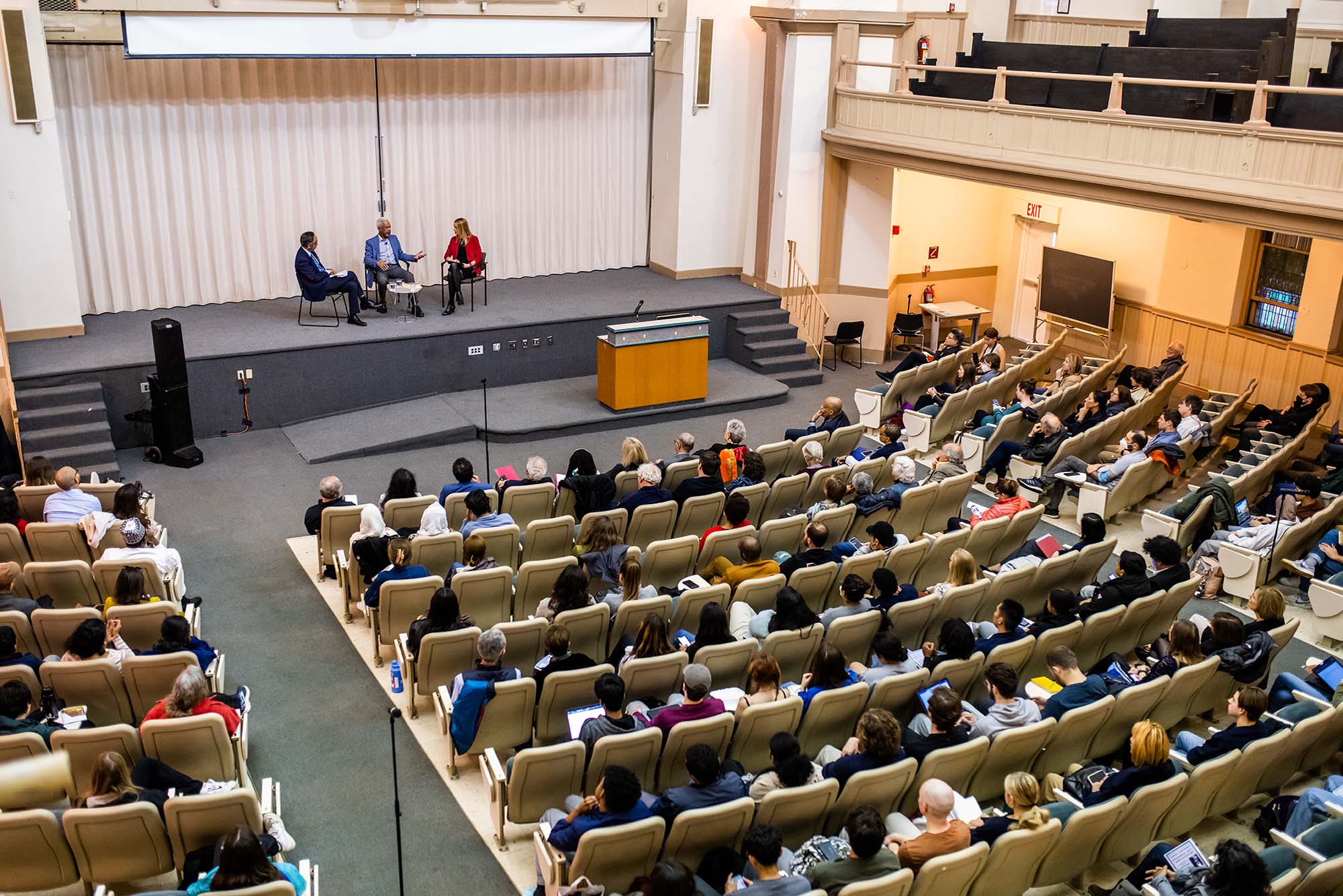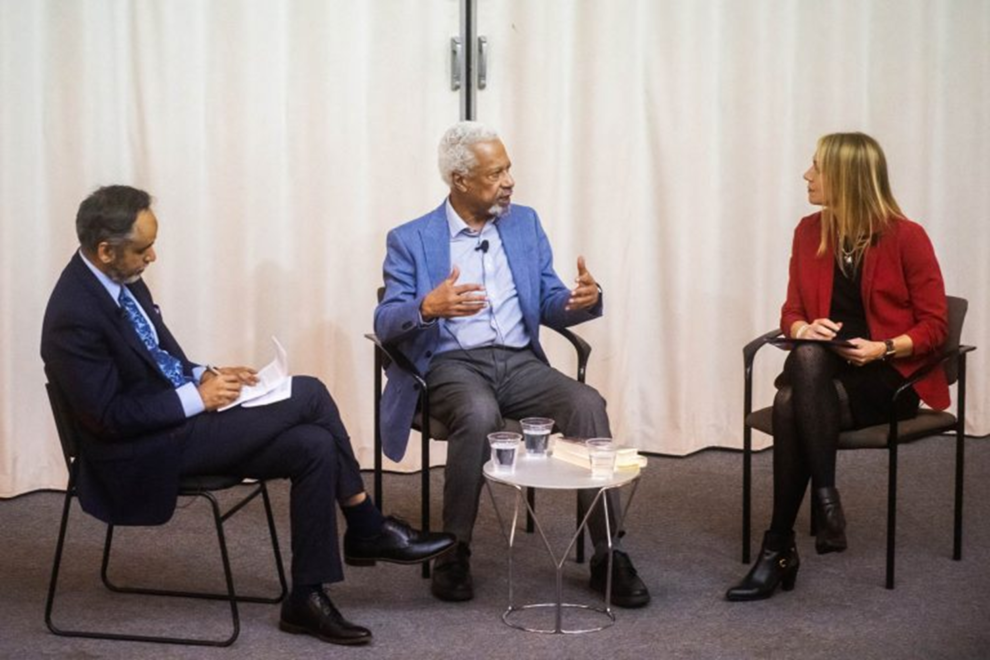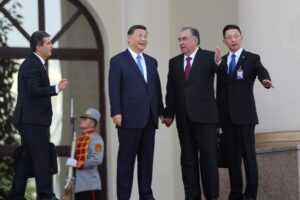When the Swedish Academy rang internationally renowned novelist Abdulrazak Gurnah to tell him that he had won the 2021 Nobel Prize in Literature, he reacted like anyone might have.
He thought it was a robocall, then a prank.
“I said, ‘WHO ARE YOU?’” Gurnah recounted with comic outrage at Morse Auditorium on Monday evening. “‘Some idiot who thinks he’s funny?’”
It wasn’t until he logged onto the Swedish Academy’s website and heard his name announced that he believed the “pretty wonderful” news.
Gurnah was the keynote speaker at the Boston University Center on Forced Displacement’s first conference on Research, Art, and Activism, Monday, April 24. The conference also featured a panel discussion of his work on Tuesday.
His appearance was “a tremendous honor” for the not-quite-year-old center, said director Muhammad Zaman, Howard Hughes Medical Institute Professor of Biomedical Engineering and International Health, who studies refugee and migrant health.
Gurnah “has written beautifully about migrants and refugees with tremendous compassion for his characters and their struggles,” Zaman said. “We are fortunate at this time in history, with its widespread conflict, racism, xenophobia, and hostility, that someone of his stature and moral clarity is joining us at BU.”
More than 200 students, faculty, staff and individuals from other local universities showed up to hear Gurnah discuss his work with Zaman and Carrie Preston, associate director of the Center on Forced Displacement, director of Kilachand Honors College, and a College of Arts & Sciences professor of English and women’s, gender, and sexuality studies.

Gurnah was born on Zanzibar, off the east coast of Africa, and left at 18 amid revolution and economic deprivation, landing in England by 1968. But he resists the idea that he was seeking asylum: “I left because I wanted a more fulfilling life.”
His 10 novels, including Paradise, By the Sea, and 2020’s Afterlives, focus on colonialism, exile, and displacement. The academy cited his “uncompromising and compassionate penetration of the effects of colonialism and the fates of the refugee in the gulf between cultures and continents.”
“Colonialism transformed the world, and decolonialism also transformed the world,” Gurnah noted during the discussion.
Asked during the Q&A period about his purpose in writing and the impact he wants to have, he said with a chuckle that he wasn’t sure he could put it in a few words, but “in the first place it was important to be engaged with and contest the colonial narrative in the part of the world I knew about, but it was important to do the same thing with the postcolonial narrative there.
“I was also interested in the way societies I knew failed because they did not value the members of that community, the way women are treated, the way children are treated, men as well—the way power works and the injustice of that,” he said.
“Gurnah draws our attention to the individual lives, in all their frailties and fortitude, their responsibilities, complicities, and resilience,” Preston said, introducing him Monday night. “He demands our compassion for, as he regularly says, the ‘small people,’ or ‘ordinary people…retrieving a life out of or after trauma.’”
We are fortunate at this time in history, with its widespread conflict, racism, xenophobia, and hostility, that someone of his stature and moral clarity is joining us at BU. —Muhammad Zaman
During the event, Gurnah read passages from his books depicting the culture clashes between a wounded teenager and a German officer in a Zanzibar hospital and between an older immigrant and a dismissive English immigration officer. The discussion focused much on those cross-border experiences and the writing process—little on politics.
In addition to his novels, Gurnah, now emeritus professor of English and postcolonial literatures at the University of Kent, is known for his scholarly works on writers such as Salman Rushdie and V.S. Naipaul. But he was not yet a major success when he returned to Zanzibar, 17 years after leaving.
Returning to one’s homeland can be “terrifying,” he said. “You don’t know what you’re going to find. Will they say, ‘What have you been doing?’ And you have nothing to show for it,” he said.
“There was a roof leak in our apartment [in England], and the insurance was precisely the amount of the ticket to Zanzibar, so we stuffed some newspapers in the leak and went to Zanzibar,” he said with a smile. “It was terrifying until I was stepping off the plane and I could see members of my family jumping up and down. Since then I have been back several times.”
Responding to questions, he cautioned against making too much of a writer’s use of his memories of home; what inspires him is just as likely to be a friend’s memory or a story someone told him, even a newspaper item.
Returning is still precious.
“You see places that have changed dramatically, and that is sad, because of the memories of those lives that people lived there,” he said. “But it is always nice to go back. There’s something about the smell.”
Tuesday’s schedule included the panel discussion of his novels with Gurnah and Preston joined by Sanjay Krishnan, CAS professor of English, Xuefei (Ha) Jin, CAS professor of English and creative writing and an acclaimed novelist, and Gaurav Desai, professor of English at the University of Michigan, Ann Arbor, as well as a seminar on resistance, activism, and art in border cultures.
The conference was cosponsored by the BU Arts Initiative, the CAS Center for the Humanities, Kilachand Honors College, the Frederick S. Pardee School of Global Studies, and the Mellon Foundation.
Source: bu.edu











